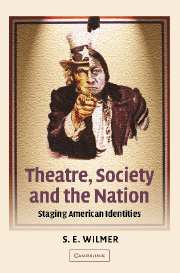Book contents
- Frontmatter
- Contents
- Acknowledgements
- Introduction
- 1 From British colony to independent nation: refashioning identity
- 2 Federalist and Democratic Republican theatre: partisan drama in nationalist trappings
- 3 Independence for whom? American Indians and the Ghost Dance
- 4 The role of workers in the nation: the Paterson Strike Pageant
- 5 Staging social rebellion in the 1960s
- 6 Reconfiguring patriarchy: suffragette and feminist plays
- 7 Imaging and deconstructing the multicultural nation in the 1990s
- Notes
- Select bibliography
- Index
1 - From British colony to independent nation: refashioning identity
Published online by Cambridge University Press: 22 September 2009
- Frontmatter
- Contents
- Acknowledgements
- Introduction
- 1 From British colony to independent nation: refashioning identity
- 2 Federalist and Democratic Republican theatre: partisan drama in nationalist trappings
- 3 Independence for whom? American Indians and the Ghost Dance
- 4 The role of workers in the nation: the Paterson Strike Pageant
- 5 Staging social rebellion in the 1960s
- 6 Reconfiguring patriarchy: suffragette and feminist plays
- 7 Imaging and deconstructing the multicultural nation in the 1990s
- Notes
- Select bibliography
- Index
Summary
In the second half of the eighteenth century, many of the settlements in North America underwent a major political and ideological transformation from isolated and dependent colonies to a united and independent nation-state. Writers with differing political perspectives and agenda used drama as a means to help define the values of the inhabitants of the territory and their political relationship with Europe. During this period, plays by Loyalist Americans and by the British military encouraged the loyalty of the settlers to the British crown. Whig or Patriot drama, on the other hand, inspired Americans to rethink their connection with the British government, and began to redefine the American colonies as potentially a separate and independent nation. This chapter will examine the changing constructions of identity in these plays and dialogues, from the early didactic plays in the 1760s that underlined the responsibilities of the American colonies to the British crown, to the drama of the 1770s that, in some cases, promoted a new notion of the nation as independent from Britain.
In eighteenth-century America, prominent religious communities, such as the Puritans in Massachusetts, the Quakers in Pennsylvania and the Presbyterians in New Jersey, disapproved of the theatre. The Massachusetts legislature passed a bill in 1750 prohibiting theatrical performances because they “not only occasion great and unnecessary expenses, and discourage industry and frugality, but likewise tend generally to increase Immorality, impiety, and contempt of religion.”
- Type
- Chapter
- Information
- Theatre, Society and the NationStaging American Identities, pp. 16 - 52Publisher: Cambridge University PressPrint publication year: 2002



